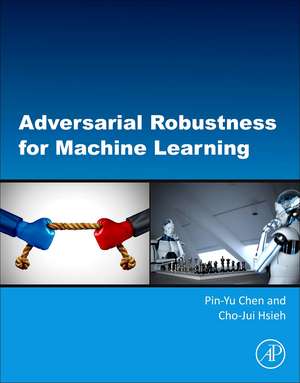Adversarial Robustness for Machine Learning
Autor Pin-Yu Chen, Cho-Jui Hsiehen Limba Engleză Paperback – 25 aug 2022
In addition, the book can also be used as a textbook for graduate courses on adversarial robustness or trustworthy machine learning. While machine learning (ML) algorithms have achieved remarkable performance in many applications, recent studies have demonstrated their lack of robustness against adversarial disturbance. The lack of robustness brings security concerns in ML models for real applications such as self-driving cars, robotics controls and healthcare systems.
- Summarizes the whole field of adversarial robustness for Machine learning models
- Provides a clearly explained, self-contained reference
- Introduces formulations, algorithms and intuitions
- Includes applications based on adversarial robustness
Preț: 464.33 lei
Preț vechi: 690.59 lei
-33% Nou
Puncte Express: 696
Preț estimativ în valută:
88.85€ • 93.00$ • 73.95£
88.85€ • 93.00$ • 73.95£
Carte tipărită la comandă
Livrare economică 24 martie-07 aprilie
Livrare express 21-27 februarie pentru 117.24 lei
Preluare comenzi: 021 569.72.76
Specificații
ISBN-13: 9780128240205
ISBN-10: 0128240202
Pagini: 298
Ilustrații: Approx. 100 illustrations
Dimensiuni: 152 x 229 x 19 mm
Greutate: 0.4 kg
Editura: ELSEVIER SCIENCE
ISBN-10: 0128240202
Pagini: 298
Ilustrații: Approx. 100 illustrations
Dimensiuni: 152 x 229 x 19 mm
Greutate: 0.4 kg
Editura: ELSEVIER SCIENCE
Public țintă
Computer scientists and engineers at Universities; R&D engineers in industry.Cuprins
1. White-box attack
2. Soft-label Black-box Attack
3. Decision-based attack
4. Attack Transferibility
5. Attacks in the physical world
6. Convex relaxation Framework
7. Layer-wise relaxation (primal algorithms)
8. Dual approach
9. Probabilistic verification
10. Adversarial training
11. Certified defense
12. Randomization
13. Detection methods
14. Robustness of other machine learning models beyond neural networks
15. NLP models
16. Graph neural network
17. Recommender systems
18. Reinforcement Learning
19. Speech models
20. Multi-modal models
21. Backdoor attack and defense
22. Data poisoning attack and defense
23. Transfer learning
24. Explainability and interpretability
25. Representation learning
26. Privacy and watermarking
2. Soft-label Black-box Attack
3. Decision-based attack
4. Attack Transferibility
5. Attacks in the physical world
6. Convex relaxation Framework
7. Layer-wise relaxation (primal algorithms)
8. Dual approach
9. Probabilistic verification
10. Adversarial training
11. Certified defense
12. Randomization
13. Detection methods
14. Robustness of other machine learning models beyond neural networks
15. NLP models
16. Graph neural network
17. Recommender systems
18. Reinforcement Learning
19. Speech models
20. Multi-modal models
21. Backdoor attack and defense
22. Data poisoning attack and defense
23. Transfer learning
24. Explainability and interpretability
25. Representation learning
26. Privacy and watermarking
